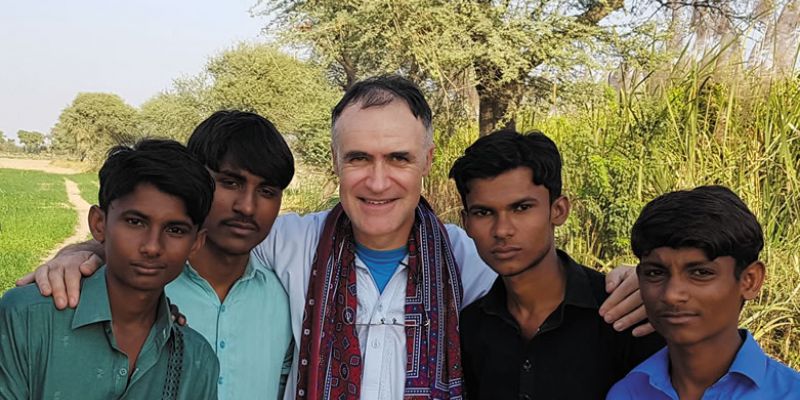
Symbolism Blooms in the Desert
In mid-January 2018, I spent a few days with our Columban missionaries in the parish of Badin, Pakistan, before attending a meeting of our Columban missionaries living and working in Pakistan. Badin is in the interior Sindh Province and is served by Columban Frs. Tony Cavanagh and Dan O'Connor. The Sunday liturgy reminded me much of Masses I myself said over many years in Fiji. Although the language of Pakistan is Urdu, its words and religious music, are remarkably similar to the Hindi of Fiji, and I found myself humming, tapping and singing along to the lively music at Mass. The liturgical symbolisms were also similar, perhaps even richer than among Fiji Indian communities; for example, children taking around the book of the Gospels —and at the end of Mass an icon of Jesus—for each of us to touch and homage. Fr. Tony also toured the congregation while sprinkling holy water during the Kyrie and a number of times he blessed us with a crucifix which never left his hand during Mass.
Back in the presbytery, during a meeting of parish workers, word came through of the serious accident of a nine-year-old boy. The rickshaw he was travelling in collided with a motorbike. The traffic in Pakistan is chaotic; one contends with humans, animals, drains, stalls and potholes in every direction. The Columbans immediately got in contact with a Maltese religious Sister who would the following day visit the boy and his family staying with him at hospital. The family had already sold their goat, rice and much everything else for medicines and fees. It was a case of Eucharist-in-action.
That afternoon, a second Mass really blew my imagination. It was among a very isolated and poor Parkari Kholi community about 45 minutes from Badin City. In between operating the gear shift for Fr. Dan O'Connor's driving (with the two of us up front along with the catechist, I had no choice but to "straddle!") I was wondering why we were carrying a cricket bat and coloring pencils, until I saw that, on arrival, Mass was not the first thing on the agenda.
The first item of the day was Fr. Dan out with about 20 kids playing cricket in a rice field and then proceeding to have them color pictures coinciding with the readings of that Sunday. Two-thirds of the children in that area are not going to school and are functionally illiterate, hence the need for visual aids. Fr. Dan used other pictures during Mass while the catechist drilled the kids with repetitions of the Ten Commandments, the seven corporal works of mercy and the creed. The Mass started after we had been fed, the darkness lit only by mobile phone lights and a few flashlights. The meal consisted of chapati (an unleavened flatbread), vegetables and a few tiny fish. I was able to play some music before and during Mass, which appeared to bring delight to the people, who—many of the adults being also illiterate—understood some of my Hindi due to its closeness to their Parkari language. Fr. Dan used the pictures colored by the children as part of the offertory and then again as catechesis after communion. He then distributed sweets, as well as a sapling which I was asked to plant, again under the light of a cell phone, in a barren field. The whole thing was quite moving, but our day was not finished yet as we were asked to bring an old man back to the city who hadn't left his bed for days. We did so, ringing ahead to a Hindu doctor and the parish tuberculosis worker. I will not say that conditions in the clinic were clean, but the man and the family members—who would sleep on his floor that night—were received with respect.
On Monday, Fr. Tony and I went to celebrate a Pakari Kholi wedding along with two catechists. We retraced our steps of the day before but going further into the interior where a full village awaited guests coming in buses, motorbikes, pony carts and on foot. Once again, the rich symbolism, coming ultimately from Hinduism, reminded me of Fiji Indian weddings. It is wonderful to see how all these cultures have survived, often only through the support of the church, and continue to give beauty and meaning in what would otherwise be a bleak and economically grim existence.
Fr. Patrick Colgan lives and works in Hong Kong.


 The Columbans are a society of missionaries, including priests and lay people, who minister to people of various cultures as a way of witnessing to the universal love of God.
The Columbans are a society of missionaries, including priests and lay people, who minister to people of various cultures as a way of witnessing to the universal love of God.